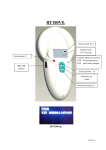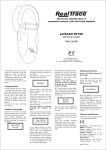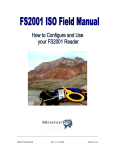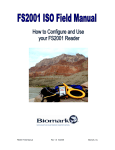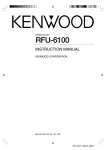Transcript
Electronic identification of companion animals with microchip implants petSCAN RT100 V5 Microchip reader User guide Congratulations, you are now the owner of a petSCAN RT100 V5. This reader can read all microchip implants of the FDXB type (conforming to the ISO norm 11784) and the FDX A widely used intended to pets identification. As you can see the product is easy to use. By pressing the button another time the reader will start to search for a microchip. The following message will be displayed on the LCD screen: Language choice Keep the reader in your hand and bring the reader's aerial near the animal's body. Scan slowly the area where a microchip is expected to be found while keeping the reader for a few centimeter's distance from the animal's skin. The reader will be scanning for about 18 seconds. Once the reader has finished searching, two situations can arise: Hold the petSCAN and press (more than 5 seconds) with thumb or index finger (right handed or left handed person) the blue button, located on the left side of the reader. The reader will display successively different languages, English, Français, Espanol, Italiano, Portugues, Deutsch, Polski. When your language is displayed, release the button. The reader will " beep " confirming your choice. Reading a transponder Switch on the reader by pressing the blue button (about 1 seconds). The reader will then be activated. After shortly displaying the language choosen by the user, the following message will appear on the display: Press SCAN To read Reading 1/ If a microchip has been found the reader will « beep » and the unique identication number is displayed: Tag : FDXB 826 068952123456 In the example shown, the reader indicates that the chip found is of FDX-B type. The identification number will be 15 digits (FDX B) or 10digits (FDXA). With FDX B the first three digit indicates either the international country code or the manufacturer code attributed by ICAR (International Committee for Animal Identification). In this case 826 is Great Britain code. The idenfication number will remain displayed on the LCD screen for about 2 minutes before the reader switches off automatically. While displaying, a new press on the button re-activates reading. Warning : once the reader is switch off, it will not be possible to display the last identification number read again 2/ If no microchip has been found after 18 seconds searching, the reader will beep three times and the following message will be displayed on the screen. No tag found display every five readings the following message: Low Low battery battery When the battery is too low the reader displays this message and switch off immediatly. To replace the battery, open the battery compartment situated under the reader and replace the used battery with a new one. Close the battery compartment and check that the locking mechanism is in place. Technical specifications The LCD screen will stop displaying the message after about 15 seconds. If this situation arises, try finding the microchip again. To do so you must re-activate the reader by pressing the button. Scan the possible microchip implantation area with as large a sweeping movement as possible. If necessary, repeat the operation after having re-activated the reader again. Replacing the battery Only use 9V alkaline batteries of the PP3 type. Conforming to CE norms and ISO 11784 (controlled by CETIM) Dimensions: L15cm,W 8cm, H 3.5cm Weight: 140 grams Power : standard 9 Volt alkaline (or lithium) battery PP3 Reading distance : FDX B (8 to 10 centimeters) FDX A (5.5 to 6.5 centimeters) Depending of the manufaturer microchip. HDX 20/25cm (ear tag) Options : RS232 (cable) or Bluetooth Temperatures: Storage conditions: -10°C to + 60°C Usages conditions: 0°C to + 50°C Designed in France – If the battery is running low the reader will beep twice and will Made in China
